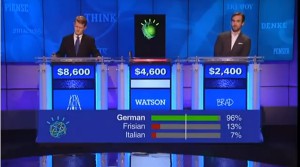I, For One, Welcome Our New Robot Overlords
Back in February, an IBM supercomputer nicknamed “Watson” won a Jeopardy tournament against 2 human opponents, both of whom were previous contestants who were extremely successful when they first appeared on the show.
This represented a huge breakthrough in artificial intelligence. One of the most difficult problems in making computers to “think” like humans is getting them to understand the subtleties of human language. When posed with a question, finding the answer was simple – Watson contained a database of millions of documents from which to look for answers.
 The difficult part, for a computer, is figuring out what’s being asked of it. This is especially true of the questions on Jeopardy, where the questions often contain puns, turns of phrase, and indirect allusions to their subjects. The fact that Watson was able to outperform its human opponents represents a spectacular leap in natural-language processing by computers.
The difficult part, for a computer, is figuring out what’s being asked of it. This is especially true of the questions on Jeopardy, where the questions often contain puns, turns of phrase, and indirect allusions to their subjects. The fact that Watson was able to outperform its human opponents represents a spectacular leap in natural-language processing by computers.
Obviously, IBM didn’t spend several years, and millions of dollars, developing hardware and software that’s really good at playing a game show. They intend to put the Watson system to good use, particularly in the medical field. Suppose a doctor is baffled by a patient’s symptoms, and the medical references aren’t helping. A Watson system optimized for medical use might allow the doctor to simply input the patient’s systems, along with other relevant information, and the computer could then search through every piece of medical literature that’s ever been digitized, and parse together a diagnosis that no human might have considered. Obviously, it would serve as a possible avenue for further investigation, and not a definitive diagnosis. Still, it could make medical care far more efficient and effective.
However, Watson also has very promising applications in another information-based profession: the law. Anybody who’s done legal research can probably imagine how useful a system like Watson could be in legal research and discovery, with its ability to search through millions of documents in a matter of seconds, and parse meaning from them. It would probably far, far more effective at finding authorities that are relevant to a particular legal question than the current “natural language” search options offered by Westlaw and Lexis, which seem to mostly rely on keyword frequency. Law clerks and doc reviewers may want to start updating their resumes.
However, an article in the Yale Law Journal suggests that Watson, or systems like it, could someday supplement, or even replace, the work done by judges. This is especially true of judges who identify themselves as “textualists.” Textualism is, basically, the idea that judges should interpret statutes according to the plain meaning of their words. This is in opposition to judges who believe that the actual intent of the legislators who drafted the laws should be considered. Textualists basically argue that, if a legislature wanted a statute to be interpreted in a particular way, they would have made it clear in the text of the statute itself.
This method of statutory interpretation is relatively formulaic and systematic. This means that if there’s any judicial philosophy that could be implemented by computerized judges, this is the one.
Also, textualists argue that judges should be completely neutral as far as policy goes, meaning that they should avoid, at virtually any cost, letting their own opinions as to what would be the “better” result get in the way of objectively interpreting statutes according to the plain and common meaning of their words. Of course, judges are humans, and have opinions and emotions. Even the most committed textualist, there’s no guarantee that their emotions might subconsciously influence their judgment. And who wants that?
So, imagine a world in which a judge could compare his or her legal conclusions to those drawn by a computer doing a complicated language analysis of the relevant statute, and the facts of the case. Computers don’t have emotions, biases, or policy preferences. They are a textualist’s dream: logical, objective, and unfeeling. Of course, if you saw the Jeopardy games in which Watson competed, you’d know that it occasionally screwed up, and delivered an absurd response, that no human, no matter how clueless they were as to the answer, would deliver. For example, during Final Jeopardy, Watson was faced with a question under the category “U.S. Cities.” Its response was “Toronto.”
Obviously, computers are not going to be replacing human judges anytime soon. However, it’s clear that technology is changing the legal world in ways that we wouldn’t have dreamed of even a few years ago. And while this system isn’t going to completely replace judges or lawyers anytime soon, it’s very likely that the technology is going to find its way into courtrooms and law offices very soon.
For this reason, it’s absolutely essential that courts come up with clear guidelines on how the assistance computers provide in rendering judgments should be used. After all, even the most mechanical method of legal reasoning still requires a good deal of nuance, intuition, and human judgment. And computers just aren’t there yet, and won’t be anytime soon.

Comments